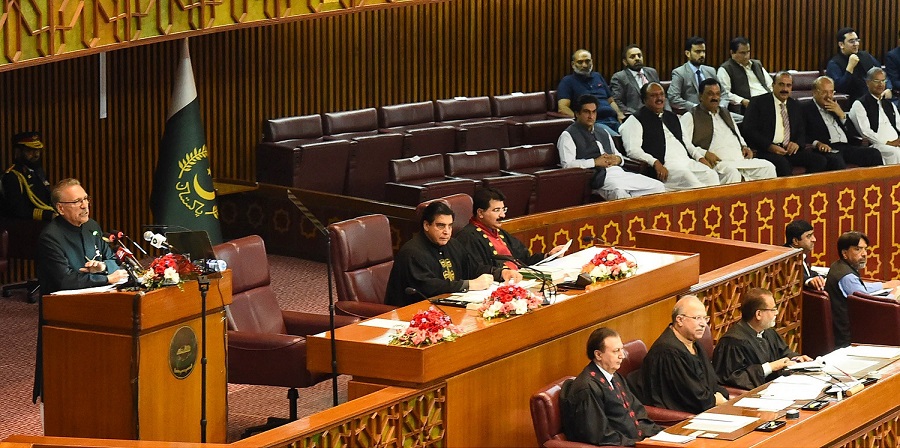ISLAMABAD– The National Assembly passed the budget for the next fiscal year 2023-24 with a majority after the government met tough International Monetary Fund (IMF) conditions.
In a last-ditch effort to clinch a stalled rescue package with the IMF, the government introduced a number of changes to its budget for the fiscal year 2024, Finance Minister Ishaq Dar had confirmed on the floor of the National Assembly.
For the fiscal year starting next month, the government will raise a further Rs215 billion in new tax and cut Rs85 billion in spending, as well as a number of other measures to shrink the fiscal deficit.
Key points
- Total outlay of the budget stands at Rs14,480 trillion
- Tax target increased to Rs9,415 billion
- Govt allocates Rs801 billion for pensioners
- NFC increased to Rs5,390 billion
- New taxes worth Rs215 billion introduced
- Rs466 billion allocated for BISP programme
- Rs900 billion for Public Sector Development Programme
During today’s session, the finance minister defended the government’s decision to amend the pension rules and said: “It was a huge burden on this cash-strapped country.”
A restriction has been imposed, and now, government employees from grades 17 to 22 are eligible for only one pension, the finance minister said, noting that it would not apply to those below grade 17.
“The issue of former government employees withdrawing more than one pension is old, it had to be resolved,” Dar, who has served as the finance minister multiple times, added.
Jamaat-e-Islami’s Maulana Abdul Akbar Chitrali proposed that the Finance Bill 2023-24 be forwarded to the Council of Islamic Ideology before approval, but the house — with a majority — rejected his demand.
The decision to amend the budget had come after Prime Minister Shehbaz Sharif met IMF Managing Director Kristalina Georgieva on the sidelines of the Global Financing Summit in Paris.
Around five days remain before the IMF’s Extended Fund Facility (EFF) agreed in 2019 expires on June 30.
Under the $6.5 billion facility’s ninth review, negotiated earlier this year, Pakistan has been trying to secure $1.1 billion of funding stalled since November.
Giving details a day earlier to the house, Dar said: “Pakistan has agreed on Rs215 billion taxes after three-day parleys with the officials of the IMF to complete the 9th review under the EFF, pending due to the country’s external financing gap.”
“As a result of the talks with the IMF, for the fiscal year 2023-24, the final taxes of only Rs215 have been agreed, ensuring that it will not burden the poor and middle segments of the society,” he said while winding up general discussion on the budget for the year 2023-24.
Pakistan, he further said, would bring down the running expenditure by Rs85 billion, which would have no impact on the proposed development budget, the raise in salaries and pensions of the federal government employees.
He said the government held talks with the Washington-based lender with complete sincerity and assured the parliament that once the things with the international lender were settled; all details would be made public by placing the agreement on the official website of the Ministry of Finance.
Resultantly, he said the proposed tax collection target of the Federal Board of Revenue (FBR) had been increased from Rs9.2 trillion to Rs9.415tr, with the provincial share going up from Rs5.276tr to Rs5.390tr, the federal government total expenditure estimate from Rs14.460tr to Rs14.480tr and pension estimate from Rs761 billion to Rs801bn.
Similarly, he said the subsidy estimate would be at Rs1.064tr and grants at Rs1.405tr, adding as a result of all these measures, the overall budget deficit would come down with a cushion of Rs300bn — Rs215 billion taxes and Rs85 billion reduction in running expenditures.
SOURCE: GEO NEWS

